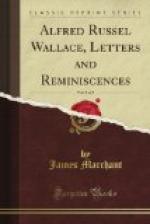It was this breadth of vision, unhampered by mere intellectualism, but always kept within reasonable bounds by scientific deduction and analysis, which constituted Alfred Russel Wallace a seer of the first rank.
Wallace lived to see the theory of evolution applied to the life-history of the earth and the starry firmament, to the development of nations and races, to the progress of mind, morals and religion, even to the origin of consciousness and life—a conception which has completely revolutionised man’s attitude towards himself and the world and God. Evolution became intelligible in the light of that idea which came to him in his hut at Ternate and changed the face of the universe. Surely it was enough for any one man to be one of the two chief originators of such a far-reaching thought and to witness its impact upon the ancient story of special creations which it finally laid in the dust. But Wallace was privileged beyond all the men of his generation. He lived to see many of the results of the theory of evolution tested by time and to foresee that there were definite limits to its range, that, indeed, there were two lines of development—one affecting the visible world of form and colour and the other the invisible world of life and spirit—two worlds springing from two opposite poles of being and developing pari passu, or, rather, the spiritual dominating the material, life originating and controlling organisation. It was, in short, his peculiar task to reveal something of the Why as well as the How of the evolutionary process, and in doing so verily to bring immortality to light.
The immediate exciting cause of this discovery of the inadequacy of evolution from the material side alone to account for the world of life may seem to many to have been trivial and unworthy of the serious attention of a great scientist. How, it might be asked, could the crude and doubtful phenomena of Spiritualism afford reasonably adequate grounds for challenging its supremacy and for setting a limit to its range? But spiritualistic phenomena were only the accidental modes in which the other side of evolution struck in upon his vision. They set him upon the other track and opened up to him the vaster kingdom of life which is without beginning, limit or end; in which perchance the sequence of life from the simple to the complex, from living germ to living God, may also be the law of growth. It is in the light of this ultimate end that we must judge the stumbling steps guided by raps and visions which led him to the ladder set up to the stars by which connection was established with the inner reality of being. That was the distinctive contribution which he made to human beliefs over and above his advocacy of pure Darwinism.
* * * * *
Reading almost everything he could obtain upon occult phenomena, Wallace found that there was such a mass of testimony by men of the highest character and ability in every department of human learning that he thought it would be useful to bring this together in a connected sketch of the whole subject. This he did, and sent it to a secularist magazine, in which it appeared in 1866, under the title of “The Scientific Aspect of the Supernatural.” He sent a copy to Huxley.




